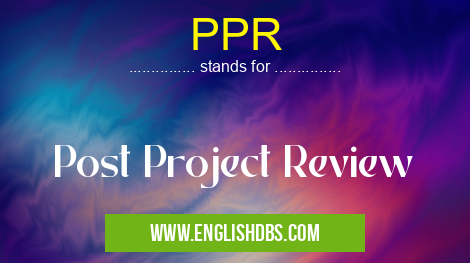What does PPR mean in SOFTWARE
Post Project Review (PPR) is an evaluation carried out for successful projects. It helps identify areas that could be improved upon for future projects or can be used to identify what went well in the past project. It is an organized process where stakeholders, customers, and management come together to assess and document the success and any shortcomings of the project as a whole. PPRs help companies stay agile and focused on providing quality products and services.

PPR meaning in Software in Computing
PPR mostly used in an acronym Software in Category Computing that means Post Project Review
Shorthand: PPR,
Full Form: Post Project Review
For more information of "Post Project Review", see the section below.
What does PPR mean?
PPR stands for Post Project Review. It is an evaluation of a successful project conducted by stakeholders, customers, and management to assess the overall performance. The objective of a PPR is to improve future projects by identifying lessons learned from the previous one, success stories and opportunities for improvement. Additionally, it documents actions taken during a project’s lifecycle to analyze whether the goals were achieved or not.
Benefits of Post Project Reviews
Post Project Reviews have many benefits including improving project management processes, providing development feedback to help increase efficiency on future projects, improving customer satisfaction levels with better quality control on services provided and product deliveries. Companies also gain valuable insight into how their teams are working together which can result in increased collaboration among departments and teams as well as better organizational performance in general.
Essential Questions and Answers on Post Project Review in "COMPUTING»SOFTWARE"
What is a Post Project Review?
A Post Project Review (PPR) is a process that allows organizations to assess how well a project was managed, from start to finish. It helps the organization gauge the effectiveness of their project management processes and identify areas where improvements can be made.
Who is involved in a PPR?
All key stakeholders involved with the project should be present for the review. This includes the project manager, project team members, executive leadership, and any external parties.
When should a PPR take place?
The most ideal time for a PPR is at the project's conclusion. This gives everyone involved an opportunity to reflect on the successes and learnings without being influenced by day-to-day tasks related to implementation.
What topics are discussed during a PPR?
During a PPR, discussion points range from the performance of team members, to budget and timeline considerations, to lessons learned and potential changes for future projects.
What methods are used to complete a PPR?
Many organizations use surveys or interviews as part of their review process; however, it’s also important to consider other methods that may help capture more nuanced feedback from stakeholders such as focus groups or roundtable discussions.
How can I ensure my team gets the most out of our PPR?
Prepare in advance by creating an agenda that outlines what needs to be discussed and creates ample opportunities for discussion. Make sure stakeholders have enough time allocated for honest self-reflection on individual performance and open communication about successes or areas of improvement.
Are there any documents I need for my PPR?
Creating pre-evaluation documents such as questionnaires or scorecards can help your team stay on track during reviews so that you don’t forget important points to discuss. Additionally, you could also consider post-review documents such as reports or action items compiled from the feedback received during your review session.
How often should I conduct PPRs?
All projects vary in size and complexity; however, it’s generally recommended that you have at least one post-project review after each major initiative so you can document findings while they’re still fresh in everyone’s minds. You could also consider scheduling smaller reviews after completion of milestones throughout larger projects for more frequent check-ins with teams.
Final Words:
Overall, Post Project Reviews are essential tools for businesses looking to continuously improve their performance by gathering crucial data from completed projects about what went well and where improvements could be made in order to produce better outcomes next time around. Understanding the PPR meaning will allow you to take advantage of these reviews so you can ensure that your team delivers quality products promptly every time.
PPR also stands for: |
|
| All stands for PPR |
